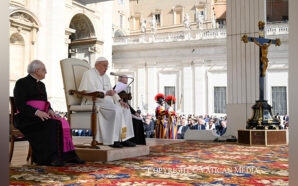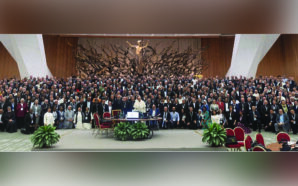This is part seven of an eight-part series on the Sacraments originally published by Franciscan Media.
Vatican II clarified that marriage is a partnership between a man and a woman ordered toward their mutual good and the procreation and education of children (cf. GS, 48.1). As a partnership, it is a union of equals who come together to form a new family. Marriage is something no one can enter into lightly because there are people involved. And where there are people, there should be protection of rights so that no one gets hurt.
There was a time when a couple could go off by themselves, exchange vows, and this was considered a valid marriage. But being human, people, particularly men, began to abuse this situation. So the Church, in an attempt to protect both the dignity of persons and the good of the sacrament, took steps to make sure that the freedom of both individuals was protected and honoured. Thus, there are requirements before getting married.
In addition, for baptised persons, Jesus raised the human institution of marriage to the dignity of a sacrament in which the love of a husband and wife truly make present the love of Jesus for the Church (cf. CCC 1601, 1613).
For those who claim marriages and weddings are private affairs, my suggestion is: try it. Any couple who thinks they are unattached quickly learn just how involved and important their lives are if they marry privately. We are social beings. Our lives touch others and are touched by others.
The Church requires that a couple go before their faith community (represented by a priest and at least two witnesses) and exchange their vows publicly because the significance of what they are doing is truly a public matter. This newly formed family is a part of both the civil and the religious community with responsibilities and privileges. The civil society recognises the new social unit of a family; the Church recognises both a new social unity within the parish and a new public witness to Jesus’ love for his Church (cf. CCC 1656).
Is divorce a sin?
Recently I talked with a man who stated that he was not permitted to receive Holy Communion because he was “in sin.” He desperately wanted to be united with the Lord and his faith community, but felt that to approach the sacrament in his state would be blasphemous. When I asked him what constituted his “sinful state,” he informed me that he was divorced. I asked if he had ever remarried and he said no.
I gently informed him that he was not excommunicated due to getting a divorce and that he was perfectly free to receive Holy Communion as he desired if there was no other issue holding him back. The sense of relief was palpable and we promised to pray for one another.
Later that evening, as I was ending my day with a short time of prayer, I prayed for that man and everyone else who is suffering from this tragic misunderstanding. While the Church does not encourage divorce, getting one does not cut one off from the faith community.
To attempt remarriage without obtaining either an annulment or a statement that the previous marriage was invalid does, however, but not the divorce. Divorced persons remain in good standing with the Church and are free to receive any of the sacraments if no other sinful behaviour stands in the way.
Are the children of an annulled marriage rendered illegitimate?
There is considerable confusion concerning the effects of an annulment, especially with regard to the legal status of the children of an annulled marriage. I believe the confusion lies in a misunderstanding of what an annulment is.
An annulment is not a “Catholic divorce.” It is, rather, an official judgement that a marriage is not sacramental, but it is natural. Simply put, a natural marriage is a lifelong partnership between an unbaptised man and/or an unbaptised woman, which is ordered to the good of the couple and the procreation and education of children. A sacramental marriage is the very same thing only between two baptised persons, which raises the dignity of the marriage to being a sacrament and a witness to the unity of Jesus with the Church. Since it is a liturgical act (an official act of the Catholic faith community), the wedding of a sacramental marriage is to take place in a church in the presence of a priest and two witnesses. As a sacrament, marriage is a grace-filled state of life in which Jesus is the third partner.
Every baptised person has the right to enter a sacramental marriage by virtue of his or her Baptism. An annulment states that the marriage in question was not a sacramental marriage, but a natural marriage. Thus, the persons involved are free to enter into a sacramental marriage later on.
Because the first marriage was a true marriage—natural but not sacramental—the children born to the couple are fully legitimate in the eyes of the Church as well as of the state. There is no change of status for the children as a result of the annulment.
I think the confusions also comes when someone says that an annulment is a statement that no marriage existed. But that comment is not accurate. An annulment says that no sacramental marriage existed, not that no marriage existed at all.
Can I get married outside?
Let’s first debunk a couple of popular notions before directly answering this question. The idea that a wedding is a private affair between the bride and groom is very romantic, but not true. The popular idea that the wedding ceremony is the most important focus of the day is also not true. Granted, a beautiful, well-planned ceremony is certainly desirable, and a beautiful church building adds to the ascetic experience. But the real focus is the sacrament that the bride and groom administer to one another for the first time at their wedding ceremony.
Because no couple is isolated from the larger community—and because marriage is a sacrament of the Church—the marriage of two baptised Christians is to take place where the faith community gathers for worship and celebrates the other public and sacramental acts of the Church.
The church building is the community’s home, and, as such, is the privileged place for the faith community to celebrate both its joys and sorrows.
Gay marriage is all over the news. What is the Church’s official position on same-sex marriage?
The Catholic community has long held that marriage—the conjugal union of one man and one woman—is a partnership of the whole of life and is ordered to the good of the spouses and the procreation and education of children (cf. CIC, can. 1055, 1). It has also defined the three “goods” of marriage as exclusivity or faithfulness, a lifelong union (indissolubility), and the procreation and education of children (cf. CIC, can. 1056).
There is no question that a gay couple can witness to the values of exclusivity and faithfulness, can enter into a lifelong union, and could see to the education of children. But only a conjugal union of a man and a woman can be procreative. And the possibility of creating new human life is a crucial part of the God-given purpose of human sexuality and marriage (cf. CCC, 2335).
What are the steps required for annulment?
An annulment is a juridical statement that a marriage is not sacramental. Thereafter, the parties involved are free to enter into a sacramental marriage. Most parish priests are able to help a couple or an individual begin the annulment process, but it will eventually require a legal procedure—argued by canon lawyers—at the local diocesan office.
The process includes the gathering of testimony and documentation supporting the claim that the marriage is not sacramental based on a lack of maturity or desire to enter into a lifelong, faithful union, which is open to the possibility of children.
The best advice for one looking to remarry—and wanting to do so with the blessings of the Church—is to discuss the situation with a priest or another qualified pastoral worker, who can advise on what practical steps are needed.
Part eight: Sacrament of Holy Orders will be published next week.
For more of Fr. Don’s thoughts on Marriage, click here.
Fr. Don Miller OFM (d. 2017) was a Franciscan priest of St. John the Baptist Province. He earned a PhD in Moral Theology from the Catholic University of America.
Used with permission from Franciscan Media (www.FranciscanMedia.org).








